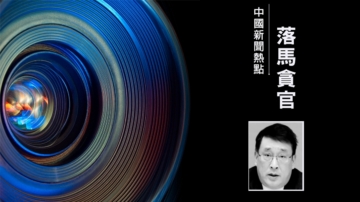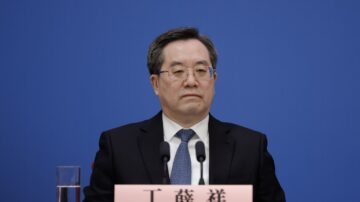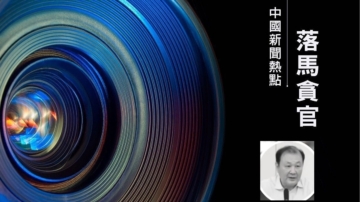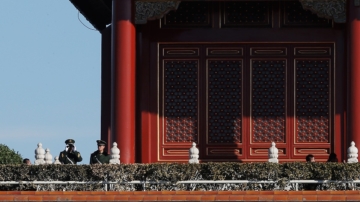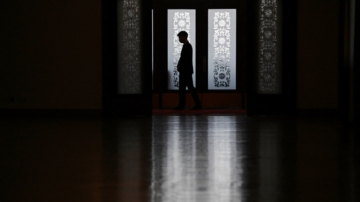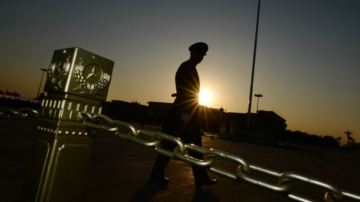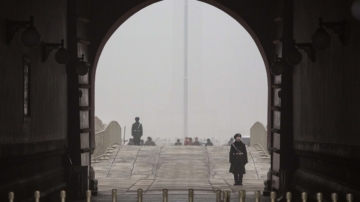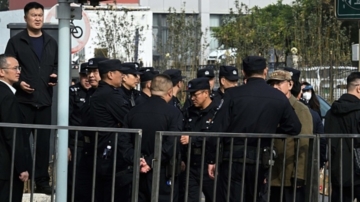【新唐人2013年04月09日讯】中共中央政法委4月7号在官方网站公布了最新组成人员,由11人组成的新一届中央政法委阵容正式亮相。由于中央政治局委员孟建柱继任政法委书记,打破了以往由中共常委出任的惯例,因此外界认为当局对政法委的安排出现了新变化。而新一届的政法委总体人员又有甚么变化呢?一起来看看。
经过去年中共十八大及今年全国“两会”两次大的调整,新一届政法委阵容的11人之中,包括中央政治局委员、中央政法委书记孟建柱、国务委员兼公安部部长郭声琨、最高人民法院院长周强、最高人民检察院检察长曹建明。
其馀7名委员中,则包括5位正部长级高官及两位现役上将,有中央政法委秘书长周本顺、国家安全部部长耿惠昌、司法部部长吴爱英、公安部党委副书记兼副部长李东生、总政治部副主任杜金才上将、武警部队司令员王建平上将、中央政法委副秘书长兼中央综治办主任陈训秋。
已经当选全国人大常委会副委员长的王胜俊不再担任政法委委员。但已经调任河北省委书记的周本顺,则仍然保留在政法委领导层中,预计后续将继续调整。
中央政法委书记过去曾三度由中央政治局常委兼任。去年十八大之后,孟建柱继任政法委书记,改变了这一做法。
因此,外界有舆论说,中共适应民意,而使得政法委出现了一些变化。不过,时事评论员刘淇昆认为,并非如此。
时事评论员刘淇昆:“政法委是共产党的暴力镇压机器的一个指挥机构,这个暴力镇压机器的指挥机构,对于共产党的生存,对于共产党的统治是非常重要的。因此我认为人民群众对政法委是痛恨的,所以政法委的负责人,官职大一点,官职小一点,这不是老百姓真正关心的,也谈不上老百姓同意不同意、甚么符合不符合民意。”
中共中央政法委,是中共领导和管理政法工作的职能部门,从宏观上组织领导公安、国家安全、司法、法院、检察院等各政法部门的工作,并指导各省区市政法委的工作。
中国不少老百姓及民主人士,一向视“政法委”为“敌人”,民间要求取消政法委的声浪不断,但是刘淇昆指出,在中共统治下这是不可能的,因为中共的专政机器需要它来协调。
而时事评论员林子旭分析,政法委的变化,说白了就是背后当家老大的人选的变化,本质上没有任何改变,真正掌控政法委的人,还在政治局常委里面。
时事评论员林子旭:“政法委书记的级别虽然有所降低,但是新一届政法委依然涵盖了公检法司等所有对民众实施专政的机构。它对中国老百姓专政的能力一点儿没有减弱。有人说周永康下去了,政法委可能会有一些变化,这些想法都是不现实的。”
有报导宣称,最高法、和最高检的掌门人周强、及曹建明,都是着名法律院校毕业的法学硕士,这也是“两高首次出现双硕士”局面。因此,新一届政法委阵容,兼顾了法学科班出身的官员与政法一线实务干部。
但刘淇昆观察分析,目前的变化,绝不是当局要对人民实行仁政或者政改,很可能是由于党内权力斗争的需要。
时事评论员刘淇昆:“以前周永康是政治局常委,他政法委,管公检法,同时管武警。这样他手中权力过大,可能别的政治局常委,甚至党的总书记,认为对自己的地位、对自的权力是一个威胁,因此到这一届,政法委书记他的官职降低了,这个我觉得主要还是从党内权力斗争,从党内权力分配这个角度去考虑的。”
林子旭指出,这些年,政法委在镇压民众的过程中不断坐大,成为了党、政、军三权之外颇有实力的第四权,这个权力最终也必然要归到中共党魁手中,因此,下面的政法委书记不过是一个摆设罢了。
采访/常春 编辑/王子琦 后制/陈建铭
New Lineup of China´s Political and Law Commission
On April 7th, The Chinese Communist Party (CCP) announced
its new members of the Political and Law Commission (PLC).
Within the 11 members, Meng Jianzhu from the Central
Committee will be the secretary of the new PLC.
This has broken the convention, which a member of
the Standing Committee was the secretary of the PLC.
Observers think that the CCP has
changed the makeup of the PLC.
Let´s find out what other changes has been made.
After the 18th Congress and the two sessions,
the CCP has made two major adjustments.
The 11 members of the new PLC include Meng Jianzhu,
Central Political Commission member and secretary of the PLC;
Guo Shengkun, a State Councilor member and
director of the Ministry of Public Security;
Zhou Qiang, director of the Supreme People's Court;
and Cao Jianming, director of the
Supreme People's Procuratorate.
The remaining seven members include
five high level officials and two active duty generals.
They are Zhou Benshun, secretary of
the Central Political Commission,
Geng Huichang, secretary of Public Security;
Wu Aiying, director of the Ministry of Justice;
Li Dongsheng, deputy secretary and
deputy director of the Ministry of Public Security;
General Du Jincai, deputy director of the
General Political Department;
General Wang Jianping, commander of the
Armed Police Force;
And Chen Xunqiu, deputy secretary of the Central
Political Commission and director of the Central
Commission for Comprehensive Management.
Wang Shengjun, who has been elected vice chairman of the
Standing Committee of the National People's Congress,
will no longer serve as a member of the PLC.
Zhou Benshun, the Hebei Provincial Party Committee
Secretary, will retain leadership of the PLC.
This last change is expected to be adjusted later.
In the past, the secretary of the central PLC was headed
by a member of the Politburo Standing Committee,
but Men Jianzhu changes that.
Thus, some observers think that the CCP did it
in order to cater to public opinion.
However, Liu Qi Kun, political commentator,
does not agree.
Political commentator Liu Qikun: "The PLC is a command
structure of the CCP´s violent suppression machine.
It is very important for the CCP´s survival and rule.
I believe the Chinese people hate the PLC so much that
they don´t care who the officials of the PLC are.
Of course, that also means the CCP does not need to comply
with public opinion—either consent or disagreement.”
The PLC serves as management unit of the
CCP´s political and legal work.
From a broad view, it is the leader for departments of
public security, national security, justice, the courts,
this includes work of the Procuratorate, as well as
branch PLC in provincial and autonomous regions.
Many Chinese people and democratic activists
have taken the PLC as their enemy.
They have continued to ask for the removal of the PLC.
However, Liu Qi Kun points out that it is impossible
because the CCP dictatorship needs it to rule.
Political commentator Lin Zixu analyses that the
changes of the PLC are only due to changing of leadership.
The nature of the CCP remains the same.
The control is still in the Central Standing Committee.
Lin Zixu: "The secretary of the PLC may be at a lower level.
However, the new PLC is still above all
the controlling units of the regime.
Some people say that without Zhou Yongkang, the PLC
will show changes. These ideas are not realistic at all.”
Some reports claimed that Zhou Qiang and Cao Jianming,
supreme law, and the head of the Supreme People 's
Procuratorate both graduated from a famous law school
with advanced degrees.
Therefore, the new lineup of the PLC with officials from
Law school will become the front-line practicing cadres.
Liu Qikun points out that the current changes are not
due to a benevolent government or political reform,
but more likely due to needs arising from
the power struggle within the party.
Liu Qikun: "When Zhou Yongkang was a member of
the Politburo Standing Committee, he was also in control
of the armed police.
Thus, he was a threat not only to other members of
the Politburo Standing Committee but also
to the General Secretary of the CCP.
Now, the PLC secretary´s power is reduced.
I believe that it is the result of a power struggle
within the party.”
Lin Zihu also points out that during these years of
suppressing people, the PLC´s power has continued to grow.
It has become a fourth power besides the party,
political and military powers.
This fourth power eventually has to go back to
the General Secretary of the party,
so the secretary of the PLC is nothing
but a decorative piece.
经过去年中共十八大及今年全国“两会”两次大的调整,新一届政法委阵容的11人之中,包括中央政治局委员、中央政法委书记孟建柱、国务委员兼公安部部长郭声琨、最高人民法院院长周强、最高人民检察院检察长曹建明。
其馀7名委员中,则包括5位正部长级高官及两位现役上将,有中央政法委秘书长周本顺、国家安全部部长耿惠昌、司法部部长吴爱英、公安部党委副书记兼副部长李东生、总政治部副主任杜金才上将、武警部队司令员王建平上将、中央政法委副秘书长兼中央综治办主任陈训秋。
已经当选全国人大常委会副委员长的王胜俊不再担任政法委委员。但已经调任河北省委书记的周本顺,则仍然保留在政法委领导层中,预计后续将继续调整。
中央政法委书记过去曾三度由中央政治局常委兼任。去年十八大之后,孟建柱继任政法委书记,改变了这一做法。
因此,外界有舆论说,中共适应民意,而使得政法委出现了一些变化。不过,时事评论员刘淇昆认为,并非如此。
时事评论员刘淇昆:“政法委是共产党的暴力镇压机器的一个指挥机构,这个暴力镇压机器的指挥机构,对于共产党的生存,对于共产党的统治是非常重要的。因此我认为人民群众对政法委是痛恨的,所以政法委的负责人,官职大一点,官职小一点,这不是老百姓真正关心的,也谈不上老百姓同意不同意、甚么符合不符合民意。”
中共中央政法委,是中共领导和管理政法工作的职能部门,从宏观上组织领导公安、国家安全、司法、法院、检察院等各政法部门的工作,并指导各省区市政法委的工作。
中国不少老百姓及民主人士,一向视“政法委”为“敌人”,民间要求取消政法委的声浪不断,但是刘淇昆指出,在中共统治下这是不可能的,因为中共的专政机器需要它来协调。
而时事评论员林子旭分析,政法委的变化,说白了就是背后当家老大的人选的变化,本质上没有任何改变,真正掌控政法委的人,还在政治局常委里面。
时事评论员林子旭:“政法委书记的级别虽然有所降低,但是新一届政法委依然涵盖了公检法司等所有对民众实施专政的机构。它对中国老百姓专政的能力一点儿没有减弱。有人说周永康下去了,政法委可能会有一些变化,这些想法都是不现实的。”
有报导宣称,最高法、和最高检的掌门人周强、及曹建明,都是着名法律院校毕业的法学硕士,这也是“两高首次出现双硕士”局面。因此,新一届政法委阵容,兼顾了法学科班出身的官员与政法一线实务干部。
但刘淇昆观察分析,目前的变化,绝不是当局要对人民实行仁政或者政改,很可能是由于党内权力斗争的需要。
时事评论员刘淇昆:“以前周永康是政治局常委,他政法委,管公检法,同时管武警。这样他手中权力过大,可能别的政治局常委,甚至党的总书记,认为对自己的地位、对自的权力是一个威胁,因此到这一届,政法委书记他的官职降低了,这个我觉得主要还是从党内权力斗争,从党内权力分配这个角度去考虑的。”
林子旭指出,这些年,政法委在镇压民众的过程中不断坐大,成为了党、政、军三权之外颇有实力的第四权,这个权力最终也必然要归到中共党魁手中,因此,下面的政法委书记不过是一个摆设罢了。
采访/常春 编辑/王子琦 后制/陈建铭
New Lineup of China´s Political and Law Commission
On April 7th, The Chinese Communist Party (CCP) announced
its new members of the Political and Law Commission (PLC).
Within the 11 members, Meng Jianzhu from the Central
Committee will be the secretary of the new PLC.
This has broken the convention, which a member of
the Standing Committee was the secretary of the PLC.
Observers think that the CCP has
changed the makeup of the PLC.
Let´s find out what other changes has been made.
After the 18th Congress and the two sessions,
the CCP has made two major adjustments.
The 11 members of the new PLC include Meng Jianzhu,
Central Political Commission member and secretary of the PLC;
Guo Shengkun, a State Councilor member and
director of the Ministry of Public Security;
Zhou Qiang, director of the Supreme People's Court;
and Cao Jianming, director of the
Supreme People's Procuratorate.
The remaining seven members include
five high level officials and two active duty generals.
They are Zhou Benshun, secretary of
the Central Political Commission,
Geng Huichang, secretary of Public Security;
Wu Aiying, director of the Ministry of Justice;
Li Dongsheng, deputy secretary and
deputy director of the Ministry of Public Security;
General Du Jincai, deputy director of the
General Political Department;
General Wang Jianping, commander of the
Armed Police Force;
And Chen Xunqiu, deputy secretary of the Central
Political Commission and director of the Central
Commission for Comprehensive Management.
Wang Shengjun, who has been elected vice chairman of the
Standing Committee of the National People's Congress,
will no longer serve as a member of the PLC.
Zhou Benshun, the Hebei Provincial Party Committee
Secretary, will retain leadership of the PLC.
This last change is expected to be adjusted later.
In the past, the secretary of the central PLC was headed
by a member of the Politburo Standing Committee,
but Men Jianzhu changes that.
Thus, some observers think that the CCP did it
in order to cater to public opinion.
However, Liu Qi Kun, political commentator,
does not agree.
Political commentator Liu Qikun: "The PLC is a command
structure of the CCP´s violent suppression machine.
It is very important for the CCP´s survival and rule.
I believe the Chinese people hate the PLC so much that
they don´t care who the officials of the PLC are.
Of course, that also means the CCP does not need to comply
with public opinion—either consent or disagreement.”
The PLC serves as management unit of the
CCP´s political and legal work.
From a broad view, it is the leader for departments of
public security, national security, justice, the courts,
this includes work of the Procuratorate, as well as
branch PLC in provincial and autonomous regions.
Many Chinese people and democratic activists
have taken the PLC as their enemy.
They have continued to ask for the removal of the PLC.
However, Liu Qi Kun points out that it is impossible
because the CCP dictatorship needs it to rule.
Political commentator Lin Zixu analyses that the
changes of the PLC are only due to changing of leadership.
The nature of the CCP remains the same.
The control is still in the Central Standing Committee.
Lin Zixu: "The secretary of the PLC may be at a lower level.
However, the new PLC is still above all
the controlling units of the regime.
Some people say that without Zhou Yongkang, the PLC
will show changes. These ideas are not realistic at all.”
Some reports claimed that Zhou Qiang and Cao Jianming,
supreme law, and the head of the Supreme People 's
Procuratorate both graduated from a famous law school
with advanced degrees.
Therefore, the new lineup of the PLC with officials from
Law school will become the front-line practicing cadres.
Liu Qikun points out that the current changes are not
due to a benevolent government or political reform,
but more likely due to needs arising from
the power struggle within the party.
Liu Qikun: "When Zhou Yongkang was a member of
the Politburo Standing Committee, he was also in control
of the armed police.
Thus, he was a threat not only to other members of
the Politburo Standing Committee but also
to the General Secretary of the CCP.
Now, the PLC secretary´s power is reduced.
I believe that it is the result of a power struggle
within the party.”
Lin Zihu also points out that during these years of
suppressing people, the PLC´s power has continued to grow.
It has become a fourth power besides the party,
political and military powers.
This fourth power eventually has to go back to
the General Secretary of the party,
so the secretary of the PLC is nothing
but a decorative piece.

